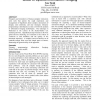Free Online Productivity Tools
i2Speak
i2Symbol
i2OCR
iTex2Img
iWeb2Print
iWeb2Shot
i2Type
iPdf2Split
iPdf2Merge
i2Bopomofo
i2Arabic
i2Style
i2Image
i2PDF
iLatex2Rtf
Sci2ools
129
click to vote
CHI
1998
ACM
1998
ACM
Exploring Browser Design Trade-Offs Using a Dynamical Model of Optimal Information Foraging
Designers and researchers of human-computer interaction need tools that permit the rapid exploration and management of hypotheses about complex interactions of designs, task conditions, and user strategies. Dynamic programming is introduced as a such a tool for the analysis of information foraging technologies. The technique is illustrated in the context of the Scatter/Gather text clustering browser. Hypothetical improvements in browser speed and text clustering are examined in the context of variations in task deadlines and the quality of the document repository. A complex and non-intuitive set of tradeoffs emerge from even this simple space of factors, illustrating the general utility of the approach. Keywords Dynamic programming, information foraging, Scatter/Gather, user models.
CHI 1998 | Dynamic Programming | Human Computer Interaction | Information Foraging | Text Clustering |
Related Content
| Added | 05 Aug 2010 |
| Updated | 05 Aug 2010 |
| Type | Conference |
| Year | 1998 |
| Where | CHI |
| Authors | Peter Pirolli |
Comments (0)

